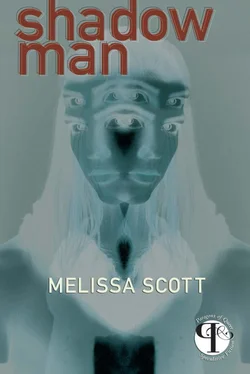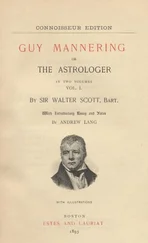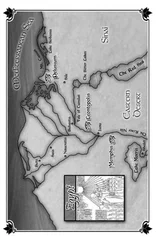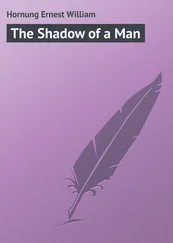Rana, ranas , also rana band , rana dancers : (Hara) a group of men and women who use traditional drum-dances to express a political opinion; rana performances are traditionally protected by the Trickster, and by custom cannot be stopped unless the ranas make an explicit request for their audience to take political action. Ranas traditionally wear multicolored ribbons, a mark of the Trickster, as a sign of their special status.
Warreven had been drinking since the polls opened at noon—sweetrum and water, cut one-and-two so that he could barely taste the alcohol—but even so, he’d nearly finished the bottle. He glanced again at the media screen, lit but with sound muted, and turned away as soon as the count for seraaliste crawled along the bottom of the display. He was still winning—had already won, if he was honest with himself, and that meant that the clan’s profits were his responsibility for the next year, until Midsummer came round again. One local year, twelve kilohours by the off-worlders’ reckoning—twelve thousand and ninety-seven hours, to be precise—before he would be free again. But the harvest surplus was squarely in his hands, to sell where he pleased. Daithef wouldn’t approve of that, anymore than he’d approved of Warreven’s candidacy, and had spent the last few days of the campaign telling anyone who would listen that it would be a full year before Stiller’s profits would be safe again.
Warreven made a face—he wasn’t that incompetent, and in any case a barrel-back clam would do a better job than Daithef—but admitted that any deal with NAPD would have to be handled cautiously. The price would have to be to NAPD’s advantage if there was any hope of using the sale to force Tatian to allow Reiss to bear witness, but it couldn’t be too good, or he himself would lose credibility with the Stiller mesnie s. His plan was beginning to seem more complicated than he’d anticipated; he grimaced again, putting the worry aside, and poured the last of the sweetrum into his cup. There wasn’t much left, and he added water to bring the mixed liquid almost to the rim of the cup.
In the screen, the image shifted, showing the Glassmarket cleared for the first night of the Stiller baanket . The major celebrations would take place tomorrow and the next day, over the two days of the Midsummer holiday, but tonight Stiller would welcome the clan and introduce the new officers to their people. He would have to attend, of course, but not for the full night. Once he had shown himself on the platform, along with the other officials, he would be free to do as he pleased, to celebrate like another Stiller. And what I please… not Reiss’s company, this time, but someone like me, another indigene . He reached for the monophone and punched in the codes before he could change his mind.
The routing codes jingled past, and then there was dead air while the last tone pulsed steadily. Warreven waited, counting, and was about to break the connection when a voice answered.
“Æ?”
The secondary screen lit, tardy, the image streaked with static. Warreven stared at it, at the visual pickup behind it, and said, “Hello, Chauntclere.”
“Raven.” Neither the tone nor the expression were welcoming. “I suppose I should congratulate you.”
“If you must,” Warreven answered. Chauntclere Ferane stared back at him from the viewscreen, patently skeptical. His hair and short beard were streaked with salt stains, patches of odd, paler color, rust and amber and straw-gold, from a season spent aboard his tender. His crew, and the divers in particular, would be piebald from the mix of coral salts, wind, and the kelps they harvested. “It wasn’t my idea, Clere.”
“I believe you.”
“God and the spirits!” Warreven glared at the screen, and after a moment, Chauntclere looked away.
“Anyway, congratulations. It says a lot for Stiller that they elected a Modernist.”
It was a peace offering of sorts, though not strictly true—Warreven was more of a moderate, if not by Ferane then by Stiller standards—and Warreven nodded, accepting it as meant. “Thanks. And, speaking of celebrations, how would you like to go to the first-night’s baanket with me? We wouldn’t have to stay long, and I thought we could hit some of the harbor bars, maybe a dance house or something, afterward.”
There was a little silence, and then Chauntclere shook his head, mouth twisting in a grimace that was intended to be a smile. “I don’t think that’s a good idea.”
“It doesn’t mean anything, I just wanted company.”
“And to hit the bars, and screw around afterward,” Chauntclere said. He shook his head again. “I don’t think so.”
Don’t flatter yourself , Warreven thought, but knew better than to say it. It would take months to talk Chauntclere out of his anger— and besides, that was exactly what I meant. I can’t slap at him for getting it right and saying no . He said, “Clere—”
“Some other time,” Chauntclere said. “You know that, you know I want to see you. Just—not tonight, not at the baanket . It wouldn’t look right, not for you, not for me.”
“Would you meet me after?”
“I—don’t know,” Chauntclere said. “Where are you going?”
“The Embankment, probably, probably to Shinbone,” Warreven answered.
Chauntclere made a face and looked away. “If I’m there, I’m there, but don’t expect me. I’ve got the boat to think about.”
Warreven sighed, acknowledging a half truth: sailors did care not what their captains did, but that certain proprieties were observed. And two of the most important rules were no trade, and sleep wry-abed in foreign ports, not at home. “All right. Did you hear anything about Catness? That was the other reason I called.”
Chauntclere answered the lie with a quick grin, but said only “I told you, I don’t know him. And I haven’t run into anyone else who does—I doubt he’s a diver, no matter what he says, or not a very good one. I’ll let you know, though, if I hear anything.”
“Tell Malemayn,” Warreven said. “I’m not handling the case anymore.”
“All right.”
“Thanks,” Warreven said, and broke the connection.
In the main screen, a team of faitou s were stacking the last cord of wood into the main balefire; a second group, supervised by a vieuvant in black and someone in traditional dress who had to be part of the outgoing clan administration, were draping the smaller fires with braids of feelgood as thick as a man’s arm. Behind them, women in traditional dress were loading clay kettles with mealie-fruit and gollies the size of a man’s fist, while other women, more practically dressed, fed the cooking fires and the stone grills set up behind the serving table. Warreven wondered what the fatuous commentators were saying, how they were explaining the quaint indigenous customs for the off-world audiences, but didn’t bother to turn up the sound. Instead, he touched keys again, typing in another mail code, and waited while the system routed his call. The holding tone sounded twice, and then the secondary screen lit again.
“Yes?” Folhare’s face in the screen was dark, hawk-nosed, strong in its cold beauty.
“Hello, Folhare,” Warreven said, and felt the old familiar fondness steal over him. If she had been a man, or he a woman—and as always put aside the knowledge that the latter, at least, was a kind of possibility, that his calculations were based on unreal gender—he, at least, would have pursued. “How’d you like to come to tonight’s baanket with me?”
Читать дальше












